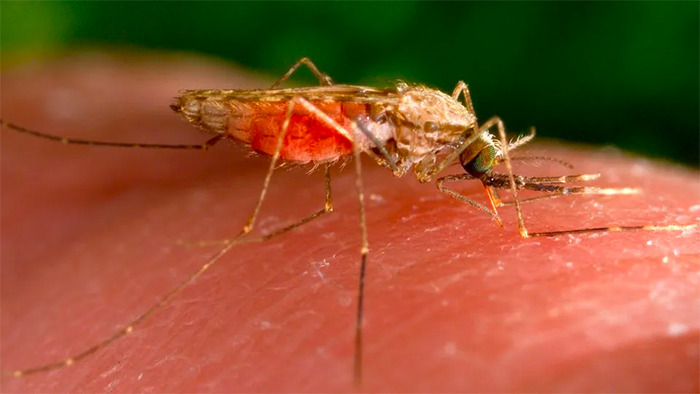
Peter Goodman: The Messy Reality of ‘Made in America’
The construction of a giant factory complex in Arizona was supposed to embody the Trump administration’s ability to bring manufacturing back to the United States.…
Thought Leader: Peter Goodman

The US Centers for Disease Control and Prevention issued an alert this week to clinicians that there are locally acquired cases of malaria in Florida and Texas, with four cases identified in Florida and one in Texas over the past two months. While thousands of Americans become sickened by malaria every year, the vast majority of cases are acquired outside of the United States. These cases represent the first time that malaria has been transmitted within the US in 20 years, according to the CDC.
Malaria is a mosquito-borne disease that leads to about 241 million infections worldwide every year, with 95% of cases in Africa in what’s known as the World Health Organization African Region. The disease is relatively rare in the US, and many readers have questions.
What is malaria, and what are its symptoms? Can it be spread through casual contact? How is it diagnosed and treated? Are there vaccines available or other ways to prevent malaria? Why are there now cases in the US? And how worried should people be that they could contract the disease?
To help us with these questions, I spoke with CNN Medical Analyst Dr. Leana Wen. Wen is an emergency physician and professor of health policy and management at the George Washington University Milken Institute School of Public Health. She previously served as Baltimore’s health commissioner.
CNN: What is malaria, and what are its symptoms?
Dr. Leana Wen: Malaria is a serious and potentially life-threatening disease that is caused by a parasite that’s spread by the Anopheles mosquito. There are five main types of malaria parasites that are part of a family known as Plasmodiidae. Plasmodium falciparum is the type most associated with severe and fatal infections, and it contributes to substantial mortality in sub-Saharan Africa and parts of South Asia.
Plasmodium vivax is the type that’s been detected in the locally acquired cases in the US, and though it tends to cause less severe disease than P. falciparum, it is still a medical emergency and must promptly be treated. Plasmodium vivax can also remain in the liver and cause relapsing disease, which is another reason for prompt diagnosis and treatment.
Symptoms of malaria range from mild to extremely severe. They include high fevers, throbbing headaches, shaking chills, muscle aches, fatigue, nausea, vomiting and diarrhea. Some individuals may become anemic and jaundiced, with yellowing of their skin and eyes, due to the destruction of red blood cells. If untreated, malaria can lead to seizures, kidney failure, coma and death.
In 2021, about 619,0000 people worldwide died from malaria, according to the World Health Organization. Most deaths occur in children younger than age 5. Other people who are at higher risk of severe outcomes include pregnant individuals and those with HIV and AIDS.
CNN: Can malaria be spread through casual contact?
Wen: No. While malaria is an infectious disease, it’s not spread from person to person. This is a vector-borne disease, meaning that it’s spread through another organism — in this case, the Anopheles mosquito. This mosquito must bite someone infected with malaria and then bite another person to spread the infection. You cannot get malaria by breathing the same air or sharing utensils with someone who has the disease. Malaria is not sexually transmitted. However, malaria can be spread through blood transfusion and sharing needles with an infected person.
CNN: How is malaria diagnosed and treated?
Wen: Malaria is diagnosed through a blood test that looks for the presence of the Plasmodium parasite under a microscope. Prompt diagnosis is important because it allows treatment to begin, and treatment is key to preventing progression to severe disease. In addition, if malaria is diagnosed in areas that typically don’t have local transmission, this allows public health officials to trace the origin of malaria and take steps to limit further spread.
There are multiple medications available to treat malaria. In accordance with CDC guidelines, they are tailored to the type of Plasmodium that is detected where the person was infected, and any specific characteristics. For example, there may be different treatments for children or pregnant patients. Severe malaria tends to be treated with an injection medication, while less severe forms could be treated with an oral pill. These antimalarials are highly effective and must be started as soon as possible. That is part of the reason the CDC issued its alert, so that clinicians can be on the lookout for possible malaria cases and hospitals can be sure to have diagnostic and treatment modalities on hand.
CNN: Are there vaccines available?
Wen: In 2021, the World Health Organization started recommending widespread use of the first and only malaria vaccine in sub-Saharan Africa and some other parts of the world where there are moderate to high levels of malaria transmission. This vaccine, known as RTS,S/AS01 or Mosquirix, has been found to reduce severe and deadly malaria by about 30%, according to WHO.
CNN: What are ways to prevent malaria?
Wen: Travelers to areas with endemic malaria are generally recommended to take prophylactic, or preventive, medications during their trip. Some medications may need to be started before travel commences, while others can be taken right before the trip and continued for the duration. These medications include chloroquine, doxycycline, atovaquone/proguaunil (Malarone) and mefloquine. Note that the vaccine is generally not recommended for travelers at this time.
In addition to what health professionals call chemoprophylaxis, which is prevention through medications, people should also try to prevent mosquito bites by using insect repellant containing DEET, wearing long sleeves and pants, using mosquito netting, and other steps. The CDC has excellent advice on controlling mosquitos around you, such as removing standing water that could lead to mosquito larvae breeding. Not only do these steps reduce the risk of malaria — they also reduce the risk of other mosquito-borne disease.
CNN: Why are there now malaria cases in the US?
Wen: This situation is actually not new. Malaria used to be endemic in warmer parts of the US. The disease was successfully eliminated by a federal agency that has since become the CDC. Methods used then include improved sanitation, widespread insecticide use and medical treatments that interrupted transmission.
While the US treats travelers infected with malaria in other parts of the world, there have not been cases of locally transmitted malaria since 2003. It is certainly worrisome that this recurrence is happening now, and it threatens the progress made decades ago. Reasons for the new cases could include increased travel bringing in more malaria cases as well as warmer temperatures that facilitate more Anopheles mosquito activity. In any case, clinicians must be alert for possible malaria cases, including in patients who do not have a travel history to malaria-endemic areas.
CNN: How worried should people be that they could contract malaria?
Wen: For people living within the US who are not traveling to malaria-endemic areas, the chance of contracting malaria is extremely low. Right now, there have been five cases in total in Florida and Texas of locally transmitted malaria. That’s enough for public health officials and clinicians to be on guard, but the public should not be worried. People should not be trying to get the vaccine or taking medications to try to prevent malaria.
Of course, everyone should still work to reduce the mosquito population around them and prevent mosquito bites whenever possible. And if people are traveling to parts of the world where local transmission of malaria is common, they need to take appropriate preventive measures, including possibly preventive medications, and be on the lookout for symptoms when they return. And those who live in warm climates and who have unexplained fever should contact their health care providers.
Peter Goodman: The Messy Reality of ‘Made in America’
The construction of a giant factory complex in Arizona was supposed to embody the Trump administration’s ability to bring manufacturing back to the United States.…
Thought Leader: Peter Goodman
Peter Zeihan: The Death of the US Tech Sector
We’re doing a two-part series on the tech sector. Today, we’ll be looking at the disruption caused by deglobalization and Trump’s policies. The gadgets and…
Thought Leader: Peter Zeihan
David Frum breaks down 2025’s defining moments
Leading author, journalist, and thinker David Frum and The Hub’s editor-at-large Sean Speer reflect on the most significant political developments of 2025. They discuss a…
Thought Leader: David Frum

